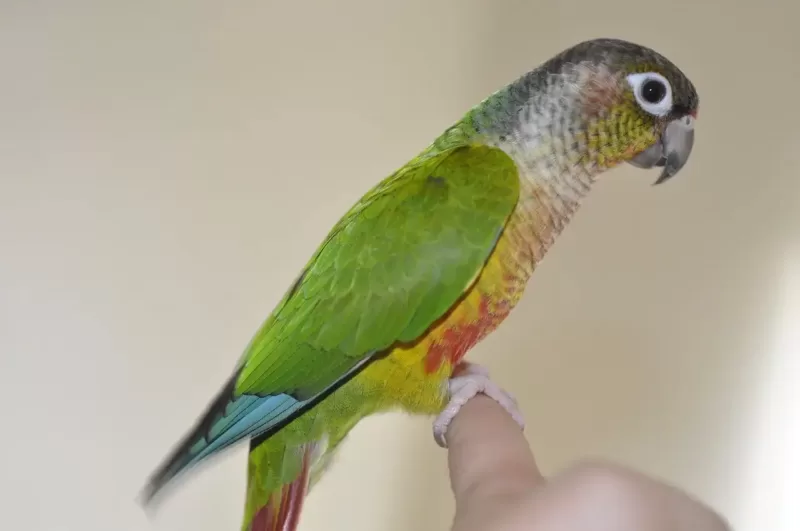Green-Cheeked Conure Care Guide
The Green-Cheeked Conure is fun, smart, personable, and fairly quiet in general, making them a great family pet in most homes. Learn all about Green-Cheeked Conure care here.
With proper care a Green-Cheeked Conure will usually live around 20 years.
Green-Cheeked Conure Size:
They typically grow to about 10 inches at full maturity.
Green-Cheeked Conure Care:
Highly personable and comical, often referred to as “little clowns”, these birds are relatively low-maintenance and suitable to most bird owners of all experience levels, even the beginner.
They tend to be quieter than similar birds, though can be taught to seek a limited vocabulary.

They will need lots of time with their human(s) to be happy, these are very affectionate birds and they do bond to their owners and human families very well.
They do best in pairs but aren’t good with birds of other kinds, so this is something to keep in mind.
Green-Cheeked Conure Diet:
Specialized pellets make up the bulk of their diet, with fortified seeds along with fresh fruits and veggies being about a quarter to a third of it.
Just be sure to keep their food and water bowls full of freshness, and any fruits or vegetables that aren’t eaten with about an hour should be removed and discarded.
Some veterinarian recommendations on diet can be found here.
Green-Cheeked Conure Habitat:
A solid cage of about 2 feet wide and deep and 3 feet tall is just right for these birds. You’ll also want multiple, strong perches for them inside, these playful birds love to hop around and do tricks like hanging upside down from a perch.
Green-Cheeked Conure Behavior:
Social and intelligent birds, the Green-Cheeked Conure enjoys and requires plenty of human interaction on a daily basis.
They also like to chew so keep lots of toys on hand to spare your furniture. Foraging toys are good for both their playing and mental stimulation needs.
Green-Cheeked Conure Care Synopsis:
A big bird in a small package, the Green-Cheeked Conure is going to give you the personality and companionship of larger parrots while still being a smaller-sized, cuddly bird.
Their care needs are minimal compared to many other species, making them one of the easier birds to keep for owners of all experience levels.
They do live around 20 years, and often longer when cared for well so this is a long commitment when you bring one home, but given their playful and affectionate dispositions, it’s a commitment worth making.
Nicholas Burns – Veterinary Technician, amateur Ornithologist
Nick has volunteered at bird rescues since he was a teenager and worked as a veterinary technician for almost two decades. He has extensive experience with animal care and a special love for birds, especially his African Grey, Scrooge (who knows all the bad words!).